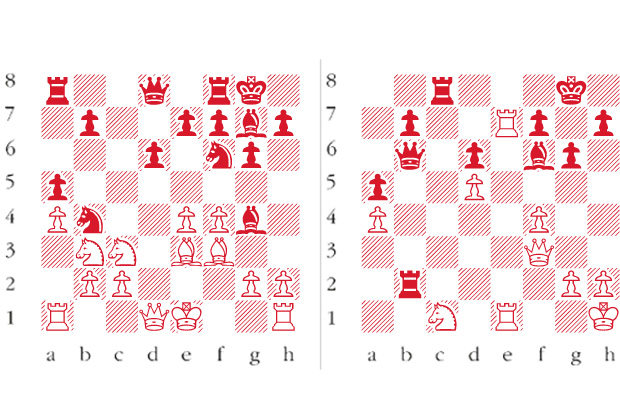I am very sorry to report the death of International Master Andrew Whiteley, a friend of mine for half a century and a well-loved character in British chess. Andrew represented Oxford on top board on two occasions in the annual Varsity match against Cambridge, won both the British Junior and English senior titles, took second prize in the 1971 British Championship and notched a highly respectable 70 per cent average over the three Olympiads in which he represented the British Chess Federation. He was also known for his indefatigable labours on behalf of the King’s Head chess club in Bayswater, where he organised powerful international events and led his team to victory on many occasions in local and national club championships. His favourite defence was the Dragon variation of the Sicilian Defence (Freudians might speculate that this was because his education commenced at the Dragon School, Oxford). Now sadly the Dragon’s fire has been extinguished.
Basman-Whiteley: Southend 1968; Sicilian
1 e4 c5 2 Nf3 d6 3 d4 cxd4 4 Nxd4 Nf6 5 Nc3 g6 This is the characteristic fianchetto of Black’s king’s bishop which introduces the Dragon Variation. 6 Be2 Not the sharpest line. More dangerous for Black is 6 Be3 Bg7 7 f3 Nc6 8 Qd2 followed either by 0-0-0 or Bc4. 6 … Bg7 7 Be3 Nc6 8 f4 0-0 9 Nb3 a5 10 a4 Nb4 11 Bf3 Far stronger is the simple 11 0-0. White had clearly overlooked the following tactics. 11 … Bg4 (see diagram 1) This throws a spanner in White’s works. If now 12 Bxg4 Nxg4 13 Qxg4 Nxc2+ 14 Kf2 Nxe3 15 Kxe3 Qb6+ and Black wins. White might have thought that he could gain the upper hand in this line with 15 Qe2 but then Black has the cunning resource 15 … Ng4+ 16 Qxg4 and then again 16 … Qb6+ winning. 12 0-0 Bxf3 13 Rxf3 After this Black can remove White’s dark squared bishop when his remaining minor pieces are far more active than their white counterparts. A superior way of recapturing, though hardly satisfactory, since it weakens White’s kingside pawn shield is 13 gxf3 as in Kinnmark-Bengtsson, Gothenburg 1975 13 … Ng4 14 Kh1 Nxe3 15 Rxe3 Rc8 16 Qe2 Qb6 17 Re1 If 17 Rc1 Bxc3 followed by … Na2 destroys White’s queenside. 17 … Rc7 18 Nd5 Nxd5 19 exd5 Rfc8 Willingly surrendering his e7-pawn in exchange for breaking into the white camp via c2. 20 Rxe7 Rxc2 21 Qf3 Rxb2 22 Nc1 Bf6 (see diagram 2) 23 Qh3 A last gasp hoping for 23 … Rcc2 24 Rxf7 Kxf7 25 Qd7+ when White turns the tables. 23 … Rbc2 24 Re8+ Rxe8 25 Rxe8+ Kg7 26 Re1 Qc5 White resigns White will lose several pawns without a shred of counterplay.
Raymond Keene
Final flame

issue 19 July 2014




Comments